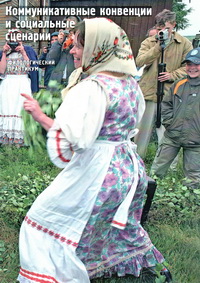
Buy from the Ivan Limbakh Publishing House
Communicative Conventions and Social Scenarios: Philological Practicum / comp. S. Adonyeva, S. Kupriyanova; ed. S. Adonyeva. St. Petersburg, 2014. 336 pages, illustrations. (in Russian)
The research presented in the book demonstrates how the methods employed in the analysis of the communicative strategies which form social relationships have been applied to factual material — the speech and behavioural practice of contemporary Russian society. The research addresses various issues: the social and linguistic mechanisms which permit the adoption of gender and age roles, traditional and new symbolic practices (from the ritual known as 'the killing of the newly-wed’ to contemporary advertising). The authors focus on the relationship between communicative conventions and social scenarios.
|
Introduction (S. B. Adonyeva) Articles Folklore in the light of the theory of communications and the conventions of folk-tale speech (Adonyeva, Svetlana Borisovna; Marinicheva, Yuliya Yuryevna) Gender and age statuses in oral speech and social practice (Adonyeva, Svetlana Borisovna) Everyday and symbolic practices: the rules of metaphoric transfer. Hunters and the hunted (Veselova, Inna Sergeyevna) The headscarf as a memory attribute in recruit ritual (Golubeva, Lyubov’ Victorovna) Marriage by elopement (Karetnikova, Anastasiya Sergeyevna) The educative function of lullabies: research tradition and cultural context (Kupriyanova, Sofya Olegovna) Life-style scenarios of the Soviet woman: the “bold one” (Mamayeva, Ekaterina Sergeyevna) “If we don't remember, there is no point in living”. ‘Non-specific’ memorial practices in the Belozer’ye region (Ponomareva, Marina Valeryevna) A folk choir on the Mezen’. The behavioural strategies of its members (Semenova, Antonina Sergeyevna) A marginal figure in social practice and discourse: ‘primak’ (Stepanov, Andrey Viktorovich; Khon, Olga Georgiyevna) Supplement Fieldwork reports and communications The social topography of the village cemetery (Barsukova, Oksana Petrovna) “No-one will escape”: the ‘killing’ of newly-wed women on the eve of the St. Peter’s fast (Baukova, Kseniya Stanislavovna) Stories about bewitched girls as an instrument of social control (Borisova, Anna Aleksandrovna) The short folklore genres in spontaneous speech: the semantics and pragmatics of proverbs (Gavrilenko, Anastasiya Aleksandrovna) Female scenarios in advertising text (Egorova, Mariya Sergeyevna) “You should call any old woman you don’t know ‘little mother’”: on the relationship between mothers-in-law and daughters-in-law (Kurzina, Nadezhda Aleksandrovna) Jokes, dissembling and other fooleries in the wedding ritual of the Mezen’ region, Arkhangel’sk province (Khotina, Svetlana Valeryevna) Publications “With very best wishes from Mitya”: letters from D. S. Nazarov, a teacher from the village of Vozhgora to his wife Anna (1939-1941). Introduction by L. V. Golubeva. |
5
11
24
31
57
74
91
100
110
119
132
153
205
211
221
230
247
262
269
277
|